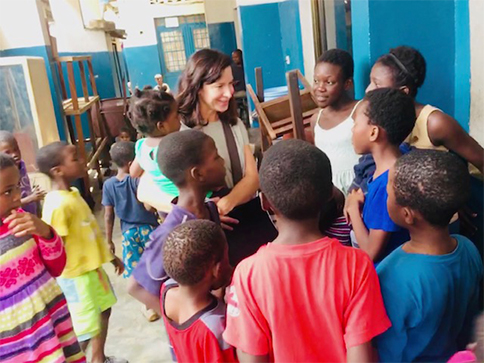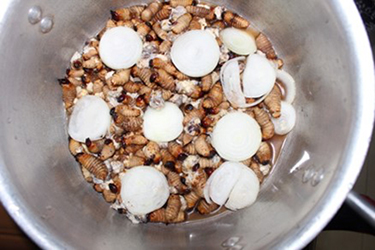By Mark Schapker
Say the word “farming,” and images of corn and wheat fields likely pop into the brain. Amy Franklin (D.V.M., ’13) is aiming to change this perception and show how insect farming is an effective and life-changing food source in developing countries.

Founder and president of the Loveland-based Farms for Orphans, Franklin’s improbable journey began while studying at CSU. A summer internship to the Democratic Republic of Congo (DRC) in 2011 to treat wild mountain gorillas changed her life forever.
She fell in love with the extensive biodiversity and vast tropical rainforests of the region but was struck by the extreme poverty and poor nutritional status in the children, many of them homeless. In 2013, she and her husband adopted two of these children and were amazed how proper nutrition influenced their development.
“During the first year, our son grew 7 inches, and our daughter 5 inches. We saw firsthand how good nutrition is crucial for growth.”
Witnessing these results and with an ambition to make a larger impact, Franklin founded Farms for Orphans in 2015, its mission to improve nutrition and education for disadvantaged children in developing countries. Naturally, she chose the DRC as a starting point.
At first, Franklin envisioned raising poultry or goats. But when she saw how the people had no land or resources to raise livestock, she rethought her options. A lightbulb went off when she read a paper about sustainable insect agriculture.
A New Direction
“Reading this paper was a turning point, and I foresaw all the possibilities. More than 2 billion people around the world eat insects as part of their diet, so culturally it wasn’t a stretch. I was also influenced by my CSU professors, who talked about the core tenets of animal health and disease management, regardless of species. I thought, ‘Why not insects? I’ve found that whether you are raising a herd of cattle or a herd of beetles, the same principles apply.’”
Enter palm weevil larvae – “mpose” in the Lingala language. High in protein, iron, and zinc, these critters are very nutritious, and raising them requires minimal capital investment and resources with virtually no risk of disease transmission, unlike regular livestock. Farms for Orphans enthusiastically moved forward with the mpose.

Results have been encouraging. In the six orphanages developed so far by FFO, they’ve harvested 100 pounds of larvae, and with the possible incorporation of crickets and honeybees as food sources, Franklin hopes to continue expanding her reach throughout the region.
The work, however, is not without obstacles. Negative perceptions in the west about eating bugs have made fundraising a challenge, and getting some orphanages to be self-sufficient with farming didn’t work out as planned.
“Early on, a couple of the orphanages were so starved for protein that they ate the larvae right away. It was too big a leap of faith for them to wait and raise them into adult beetles.”
What about the taste?
“I get excited before my trips to the Congo, because I know I’m going to eat the mpose every day. They’re kind of like small sausages but have their own taste and texture. They’re delicious when fried with spices and vegetables.”

It’s a brave new world, and there’s no doubt that Amy Franklin is one of the pioneers.
Franklin has lectured for the CSU Master of Public Health program and worked with students at the Global Perspective of Health. She recently received the International Humanitarian Award from the United Nations Association of Northern Colorado in December 2018.
To learn more about Farms for Orphans and how you can make an impact, visit their website.
The Welsh Rabbit: A Local Option for Insect Connoisseurs
We may be a long way from cricket patties at grocery stores and Beetle Macs at fast food chains, but if you want to try the finest in insect cuisine, the Welsh Rabbit and Cheese Shop in Old Town Fort Collins is the place to be.

Owned and run by Nate, Dean, and Nancy Hines, the Welsh Rabbit offers a delectable delicacy of roasted crickets with spices/sauce, in addition to turmeric-steamed pancakes with crickets. They’re also exploring a Korean silkworm pasta option for the new year. For every plate ordered, $5 goes to Farms for Orphans.
Nate described how social consciousness is a major motivator of their business, so they were more than happy to partner with Amy Franklin and help make an impact.
In addition to its insect plates, the Welsh Rabbit also offers a wide variety of cheeses, wines, and high-quality meals and small bites – and a welcoming atmosphere. Its bistro and cheese shop are now in separate locations but within a block of each other in Old Town Fort Collins.


































































